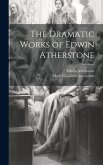1. The Dawn, 2. A Dean, and A Chapter Also, 3. The Nuns House, 4. Mr. Sapsea, 5. Mr. Durdles and Friend, 6. Philanthropy in Minor Canon Corner, 7. More Confidences than One, 8. Daggers Drawn, 9. Birds in the Bush, 10. Smoothing the Way, 11. A Picture and A Ring, 12. A Night with Durdles, 13. Both at their Best, 14. When Shall These Three Meet Again?, 15. Impeached, 16. Devoted, 17. Philanthropy, Professional and Unprofessional, 18. A Settler in Cloisterham, 19. Shadow on the Sun-Dial, 20. A Flight, 21. A Recognition, 22. A Gritty State of Things Comes On, 23. The Dawn Again.
Hinweis: Dieser Artikel kann nur an eine deutsche Lieferadresse ausgeliefert werden.
Hinweis: Dieser Artikel kann nur an eine deutsche Lieferadresse ausgeliefert werden.








